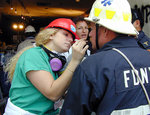A few of our stories and columns are now in front of the paywall. We at The Chief-Leader remain committed to independent reporting on labor and civil service. It's been our mission since 1897. You can have a hand in ensuring that our reporting remains relevant in the decades to come. Consider supporting The Chief, which you can do for as little as $3.20 a month.


Like many people around the world on Sept. 11, 2001, Registered Nurse Patricia Tyrrell watched the Twin Towers collapse on television.
But unlike most, she saw the devastation up close during the two weeks she spent at Ground Zero providing first-aid to first-responders working on the pile.
'Something I'll Live With'
“There was no comparison to being down there in person, I don’t care how big your big screen TV is. It’s something I will live with the rest of my life,” she said.
Ms. Tyrrell, who has served as a mayoral nurse—one assigned to city agencies—since 1993 and is a member of the New York State Nurses Association, worked 12-hour shifts at a medical clinic that was set up in lower Manhattan, where she provided health evaluations of those working non-stop on the recovery effort, bandaging cuts and bruises and performing eye flushes along the way.
Even though she was two months pregnant at the time, she volunteered to take the night shift, which ended at 4 a.m.
“My city needed me; the members of service needed me,” Ms. Tyrrell said.
Though she stayed emotionally strong during those two weeks, the gravity of the situation finally caught up to her during the car ride leaving her final shift.
'So Relieved'
“I remember crying in the back of the van,” Ms. Tyrrell recalled. “I was so relieved I didn’t have to go back there. I wish I didn’t have to see any of that.”
But she never could have anticipated the long-lasting health effects of the toxic dust first-responders and civilians were exposed to during the weeks and months after the attacks.
More than 4,600 people who participated in the World Trade Center Health Program have died of cancer, respiratory illnesses, heart disease and other 9/11-related health conditions. As of June this year, 107,415 people were enrolled in the World Trade Center Health Program, which provides free health screenings and health care to first-responders and symptomatic survivors.
Ms. Tyrrell, who provides annual health exams for the city’s first-responders and aids those who have line-of-duty injuries, said she first started seeing that people who helped in the cleanup were getting sick about five years after the attacks.
'Same Cancer, Same Time'
“You’d notice that a whole bunch of people at the same command had the same type of cancer at the same time, which was unusual,” she stated. “And since then it’s been non-stop.”
The most common ailments she’s witnessed were respiratory conditions: “People who had never been asthmatic were getting asthma,” she noted.
Ms. Tyrrell also has breathing issues related to 9/11. “Every winter I know to expect bronchitis. I’m grateful I haven’t been really sick,” she said.
Seeing so many people come down with 9/11-related illnesses over the years, especially since most of the first- responders were healthy and young, “was really eye-opening.”
“But in retrospect, you look back and think ‘how could it not [have made people sick]?’” she said, noting the toxic materials the towers were made from, including asbestos.
One of the major lessons medical professionals—and society in general—have learned because of 9/11 was the importance of emotional and mental health, she believed.
Lost Its Stigma
“When I first started working, just saying ‘mental health’ was a big no no,” Ms. Tyrrell recalled. “These were tough guys.”
But over the years, she’s noticed a lot more willingness from both the city to provide mental-health resources and from members of service to accept help.
“These guys weren’t really trained for the things they saw then,” Ms. Tyrrell said. “There’s no shame in saying ‘I’m overwhelmed.’”
She’s referred many uniformed workers over the years to the World Trade Center Health Program.
“Even if a member of service doesn’t have any symptoms, everybody is encouraged to enter the program. This is how we pick up trends,” she said.
'Still Coverage Gaps'
Although nearly 70 types of cancer have been linked to 9/11, gaps in coverage remained. Administrators for the program rejected uterine cancer as a covered condition, citing a lack of evidence that a connection to 9/11 existed, and endometrial cancer also was not covered.
The gap existed because an overwhelming number of the first-responders who participated in the WTC Health Program were men, and while the number of male and female survivors was more-evenly balanced, the low rate of participation in the program among survivors has affected that data.
“We do need more of a female perspective there,” Ms. Tyrrell noted.
She added that those afflicted with 9/11-related illnesses have had their conditions compounded by the coronavirus, particularly those with respiratory problems.
'A Lot of Long-Haulers'
“I think people dealing with 9/11 health issues and then COVID, a lot of them are long-haulers,” she said. “I think it’s really put a dent on people’s health profiles.”
Ms. Tyrrell has worked for decades to emphasize the importance of preventive care.
“With the 20th anniversary coming on the heels of the pandemic, one thing I can say is that people are rallying around how important it is to monitor your health—9/11-related or not,” the veteran nurse said.
We depend on the support of readers like you to help keep our publication strong and independent. Join us.
Comments
No comments on this item Please log in to comment by clicking here